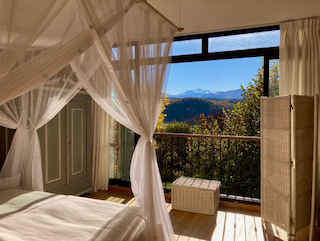Buying a house and making the move to France is not as complicated as it sometimes might seem but there are a few boxes that you need to tick if you want the process to be as stress-free as possible. Below is a very simple 10-step checklist to make sure you don’t miss any of the essentials, from finding a property to obtaining the correct visa, making the move, sorting out all the administration and, finally, settling into your new life in France.
- Define your location and budget
Research different regions of France and decide what lifestyle suits you best whether that be countryside, village or town, bustling community, or isolated hideaway and then the type of property you are looking for and the transport links. Factor in property prices, notaire fees, renovation costs, and local taxes.
- Find your home
I might be biased on this one, but I would suggest you use a property finder; finding the perfect house in France is not as easy as it is in other countries and can be very time consuming and frustrating. Take your time and also, once you have found your house, be prepared for the buying process to take a good four months from offer to completion. And that the paperwork will be in French.
- Secure financing
If you are hoping to buy with a French mortgage, open dialogue early with banks or mortgage brokers. Non-residents can obtain French loans, but proof of income and larger deposits (20–30%) are usually required.
- Apply for the right visa
Non-EU citizens moving permanently must apply for a long-stay visa (visa de long séjour valant titre de séjour, VLS-TS) before arriving in France. After your first year, you can apply for a renewable residence permit, a carte de séjour pluriannuelle (multi-year residence permit). From January 2026, you’ll need A2 French proficiency (that is to say you can handle very simple everyday tasks in French). After five years of legal residence, you may apply for permanent residency or even French citizenship. For a permanent carte de séjour 10 ans, you will need B1 French (you can cope with routine conversations, understand main points of clear speech, and write simple phrases) and to show integration, a stable income, tax compliance, and a fixed residence.
- Plan to move of your belongings
If you’re importing household goods, use an international removals company experienced with French customs. Goods for personal use can usually be imported duty-free, but you’ll need a detailed inventory and proof of your change of residence.
- Bring your pets
Dogs, cats, and ferrets need a microchip, valid rabies vaccination, and a pet passport or health certificate. Check the latest EU entry rules well ahead of time to avoid quarantine delays. Once you are in France, register at your local vet and get a pet passport and then you can travel easily.
- Open a French bank account
A local bank account is essential for paying utilities, taxes, and receiving income. Some banks allow you to open an account with a passport and proof of address, while others may ask for a residence permit. Online banks such as Boursorama or traditional ones like Crédit Agricole are popular choices.
- Arrange healthcare and insurance
Register with the French health system (Assurance Maladie) once you are resident but expect a waiting period of up to three months. In the meantime, private health insurance is required. Most residents also take out a mutuelle (top-up insurance) to cover costs not reimbursed by the state.
- Sort out daily life logistics
Register at your local Mairie, sign up for utilities (water, electricity, internet), don’t be scared to ask for help and sign up for French lessons; having a good grasp of French will help enormously with integration.
- Embrace the French way of life
Moving is not just about paperwork. Take the time to connect with neighbours, explore local markets, join some clubs, and accept that most places here still close for lunch and on Sundays and nothing happens very quickly so it is best to relax into the slower rhythms of French life and eventually you will begin to adapt and enjoy and wonder what all the rush was about anyway.
With the right preparation, your move to France can be smooth and deeply rewarding but, as with everything, a lot of the long-term success is founded in the early planning stages. If you need help with your move to France, please get in touch: nadia@foothillsoffrance.com






I would also consider adding.
Don’t import a car or motor caravan (camping car) The costs of doing this have risen considerably and the expenditure is not adding value to the vehicle and you still going to be left with a right hand drive vehicle which has even less value on the open market here in France. Best to sell your vehicles and buy over here in France.
Vehicles from outside of France are becoming even harder too to register.
Do your research before attempting to import such items.